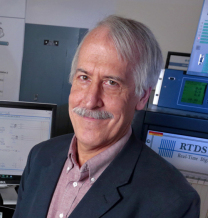AMES, Iowa – Iowa State University is working with the Iowa National Guard and the state’s Office of the Chief Information Officer to establish the country’s first statewide program dedicated to cybersecurity and literacy.
The Iowa Cyber Alliance is designed to bring together partners from education, industry, government and trade groups to provide cybersecurity education, outreach and training to residents across the state.
“By bringing all of these people together, we hope to build an ecosystem of cybersecurity in the state,” said Doug Jacobson, a University Professor of Electrical and Computer Engineering at Iowa State, the chair of the university’s Information Assurance Center and a leader of the alliance project.
Leaders of the alliance will have a kickoff meeting this week to begin defining the alliance, setting long- and short-range goals and establishing a structure. The meeting will be Wednesday, Jan. 11, from 8:30 a.m. to 4 p.m. in the Camp Dodge Freedom Center at 7105 NW 70th Ave. in Johnston. Reservations are required and photo identifications are needed to enter the base.
Registration information is available here.
Jacobson said the alliance grew out of a federal grant proposal. Although the proposal wasn’t funded, he didn’t want to drop the idea and its top goal.
“The goal of the Iowa Cyber Alliance is to establish Iowa leadership in information security, literacy, education and research,” according to a summary of the alliance. “This effort will create a safe and secure Iowa by delivering security literacy to all Iowans, providing educational pathways to grow the cyber workforce and new technology-based, information-security capabilities to the benefit of the state, region and nation.”
The alliance also aligns with the State of Iowa’s Cybersecurity Strategy that was released in July 2016. The strategy, in part, aims to improve cybersecurity awareness training, public education and communication, public-private collaboration and education in science, technology engineering and math.
Jacobson said the new alliance will be built on the four pillars Iowa State programs have used to promote studies of information technology and cybersecurity:
- Enlighten by exposing people to the field of cybersecurity.
- Engage by providing interested people with contests and other opportunities to be involved in cybersecurity.
- Educate by developing pathways between secondary and higher education, aligning education programs with industry needs and providing educational opportunities in secondary schools, including internships.
- And employ by matching students with cybersecurity jobs.
Jacobson said he’s hoping for a wide range of partners willing to help strengthen those pillars and build the Iowa Cyber Alliance.
“We want everybody with an interest to come to the table,” he said. “Hopefully we can come up with a way to help the state produce enough students that maybe companies will want to set up shop here. Cybersecurity jobs pay well. And I don’t think they’re going to go away anytime soon.”


